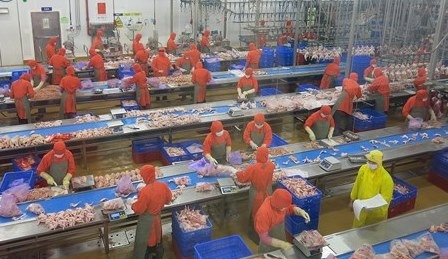Viet Nam’s exports of agricultural products are expected to face more challenges by the end of the year, so enterprises must follow market developments at home and abroad and improve the quality of their products, according to experts.

Viet Nam’s exports of agricultural products are expected to face more challenges by the end of the year, so enterprises must follow market developments at home and abroad and improve the quality of their products, according to experts.
Vu Tien Loc, chairman of the Viet Nam Chamber of Commerce and Industry (VCCI), said Viet Nam’s export goods, especially agro, forestry and seafood products are facing a number of obstacles in major markets, including impacts from the US-China trade war and the European Union (EU)’s “yellow card” warning against fisheries exports.
With the “yellow card”, all export seafood products from Viet Nam to the EU have had to be checked by the authorities of the importing country under the EU. That is a big barrier for Vietnamese products in one of the country’s major markets.
Minister of Trade and Industry Tran Tuan Anh said there would be no small difficulties for Viet Nam’s exports if the US-China trade war is prolonged. By year end, Viet Nam’s export goods are expected to face many challenges.
Importing countries would further strengthen protection measures, food safety standards and environmental protection standards. Those would make it difficult for Viet Nam’s export products to enter those markets.
Besides that, there is the US catfish inspection programme, Forest Law Enforcement, Governance and Trade (FLEGT) for wooden products and regulations on traceability in many import countries.
Therefore, according to the Ministry of Industry and Trade, enterprises need to update market information and improve the quality of export goods, meeting strict regulations and standards in export markets, reported the Dai doan ket (Great Solidarity) newspaper.
The ministry said the fisheries industry must work hard by January 1, 2019 to remove the yellow card.
According to the Ministry of Agriculture and Rural Development, the national export value of agriculture, forestry and seafood products in the first six months of this year marked a year-on-year increase of 12 per cent to reach US$19.4 billion.
Of this, the export value rose by 9.7 per cent for agricultural products to reach $10.3 billion, by 10.5 per cent for seafood products to $3.94 billion and by 12.7 per cent for main forestry products to $4.33 billion compared to the same period last year.
Other products that recorded high export growth in the first six months of the year included rice (up by 42 per cent to $1.81 billion), vegetables and fruits (up by 20 per cent to $2 billion), cashew nuts (up by 16.4 per cent to $1.71 billion) and wood and wooden products (up by 12.1 per cent to $4.1 billion).
The US and China are the two largest export markets for Viet Nam’s farm produce, especially vegetables and fruit, so the trade war between the two countries would have a big impact on such products in Viet Nam.
Experts in the agricultural sector said that under pressure from the US’ increase of import tariffs on Chinese exports, China’s agricultural products will have to find alternative markets.
With great supply and cheap price, Chinese vegetables and fruits will continue to compete with Vietnamese versions. Meanwhile, to avoid China’s high import tariff at 25 per cent for US agricultural products, the US is likely to promote export agricultural products to Viet Nam, including fruit as well as meat of cattle and poultry.
The Viet Nam Customs said in May, US meat imports accounted for 37 per cent of the total import meat volume to Viet Nam, becoming the largest exporter of meat to Viet Nam. The US exported 11,000 tonnes to Viet Nam in May, worth more than $13 million, a month-on-month increase of 50 per cent in value. — VNS





